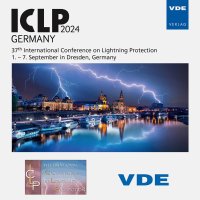Discharge Propagation in Sub-Meter Gaps of EGLA/Rod-Rod Parallel Electrodes under Short-tail Lightning Impulse Voltage for Multi-Phase Back-flashover Study
Conference: ICLP 2024 - 37th International Conference on Lightning Protection
09/01/2024 - 09/07/2024 at Dresden, Germany
Proceedings: ICLP Germany 2024
Pages: 7Language: englishTyp: PDF
Authors:
Nakane, Ryuichi; Miki, Toru; Miki, Megumu
Abstract:
Multi-phase back-flashover phenomena are significant lightning accidents for overhead transmission lines, leading to double-circuit faults and interruptions of the power supply. In Japan, externally gapped line arresters (EGLA) have been applied mainly to overhead transmission lines below 154 kV class for several tens of years, which have excellent features to improve lightning protection performance. On the other hand, the conditions of multi-phase back-flashover occurrence for overhead transmission lines with EGLA applications have not yet been clarified quantitatively. In this paper, the concurrent flashover characteristics are reported by using the EGLA/Rod-Rod parallel electrode configuration under lightning impulse voltage, simulating back-flashover across 2 phases for a transmission tower. The discharge propagation characteristics are discussed based on the discharge observation results in the series air gap of EGLA and the Rod-Rod gap set to the gap length used in actual 66/77 and 154 kV overhead transmission lines in Japan. In the EGLA/Rod-Rod parallel electrode configuration, the 1st flashover occurs at the series air gap of EGLA, and the 2nd flashover at the Rod-Rod gap in response to the application of a single lightning impulse voltage. As a result, the concurrent flashover rate and 1st to 2nd flashover time in the EGLA/Rod-Rod parallel electrode configuration depend on the averaged electric field in the Rod-Rod gap after the 1st flashover.


